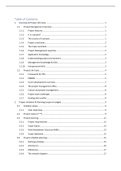Summary
Summary Project Management Advanced
- Course
- Institution
In dit samenvatting vind je volgende modules: - Overview & PLC - Project Initiation & Planning - SM & RM - From WBS to Gantt Chart - (Intro) Information Management - Storytelling with Data - Intro Change Management - Quality Management
[Show more]



